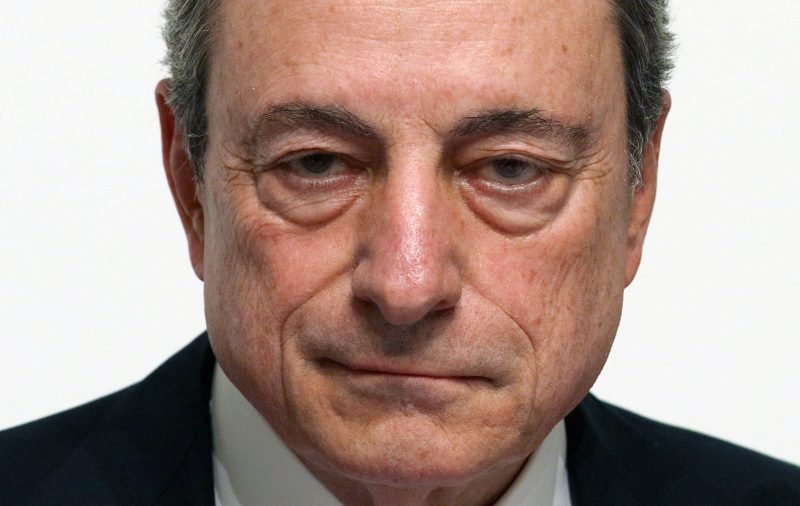ECB’s Draghi brushes off Trump charge of currency manipulation
Plenty of tools in the box, and not afraid to use them (Stringer)
Frankfurt am Main (AFP) – European Central Bank chief Mario Draghi said Tuesday that the institution “doesn’t target the exchange rate”, shrugging off an allegation of currency manipulation from US President Donald Trump.
“We have our remit. We have our mandate. Our mandate is price stability” or inflation just below two percent, Draghi told a central banking conference in Sintra, Portugal.
“We are ready to use all the instruments that are necessary to fulfil this mandate, and we don’t target the exchange rate,” he added.
Draghi’s statement that weak economic growth and sluggish inflation could prompt the ECB to slash further rates already at historic lows had earlier sparked Trump’s ire.
“Mario Draghi just announced more stimulus could come, which immediately dropped the Euro against the Dollar, making it unfairly easier for them to compete against the USA,” Trump said via Twitter.
“They have been getting away with this for years, along with China and others,” he added.
Draghi said in a speech that “further cuts in policy interest rates… remain part of our tools” as the bank looks to juice growth and inflation.
Eurozone policymakers had already discussed potential rate cuts in early June, but Draghi’s Tuesday remarks were the first to catch markets’ full attention.
That was in part because he said the central bank was ready to move “in the absence of improvement” rather than if economic conditions worsen, lowering the threshold for action.
Germany’s DAX index of blue-chip shares leapt into the black from negative territory — adding 2.1 percent around 5:15 pm (1515 GMT) — and pushed the euro down as much as 0.3 percent against the dollar, to $1.12, before rebounding slightly.
“German DAX way up due to stimulus remarks from Mario Draghi. Very unfair to the United States!” Trump tweeted.
Many of the DAX companies like carmaker BMW or chemical company Bayer in fact have a massive US presence.
And 10-year government bond yields in France briefly dipped into negative territory for the first time ever — joining Germany, the Netherlands and Austria in the club of countries investors pay to lend them money — before ticking up to 0.01 percent mid-afternoon.
Draghi’s speech was “the clearest indication yet that the bank will cut interest rates and relaunch its asset purchase programme in the coming months if… measures of inflation and inflation expectations remain very low,” said Andrew Kenningham of Capital Economics.
From the start of his presidency in 2017, Trump accused trading partners like China and eurozone heavyweight Germany of currency manipulation.
Both countries and others like Japan and South Korea remain on a Washington watchlist, the US Treasury department said last month, but have not been formally singled out as manipulators.
– Action in the air –
The ECB blames weakening economic growth on US-led trade conflicts, the looming threat of a no-deal Brexit and slower performance from emerging economies.
With slower expansion, price growth was well short of the ECB goal of just below two percent in May, at 1.2 percent.
“In the absence of improvement, such that the sustained return of inflation to our aim is threatened, additional stimulus will be required,” Draghi said.
Aside from rate cuts, the ECB could restart its 2.6 trillion euro ($2.9 trillion) “quantitative easing” (QE) purchases of government and corporate debt.
For now the Frankfurt-based central bank is on hold after promising no rate rises until at least mid-2020, while the US Federal Reserve is also making hints towards its first rate cut in more than a decade as confidence ebbs from the economy.
– Virgin territory –
Any new lowering of rates in the eurozone would be a step further into the unknown for the ECB, which has since 2014 charged banks to park cash with it, using a negative deposit rate now at -0.4 percent.
“We think the bank will cut its deposit rate from -0.4 to -0.5 percent in December,” Capital Economics’ Kenningham predicted.
Meanwhile any restart of QE might require loosening some of the ECB’s self-imposed rules on the scheme, designed to fend off allegations it is financing government spending by printing money.
Nevertheless, “the asset purchase programme still has considerable headroom,” Draghi said.
Disclaimer: Validity of the above story is for 7 Days from original date of publishing. Source: AFP.


